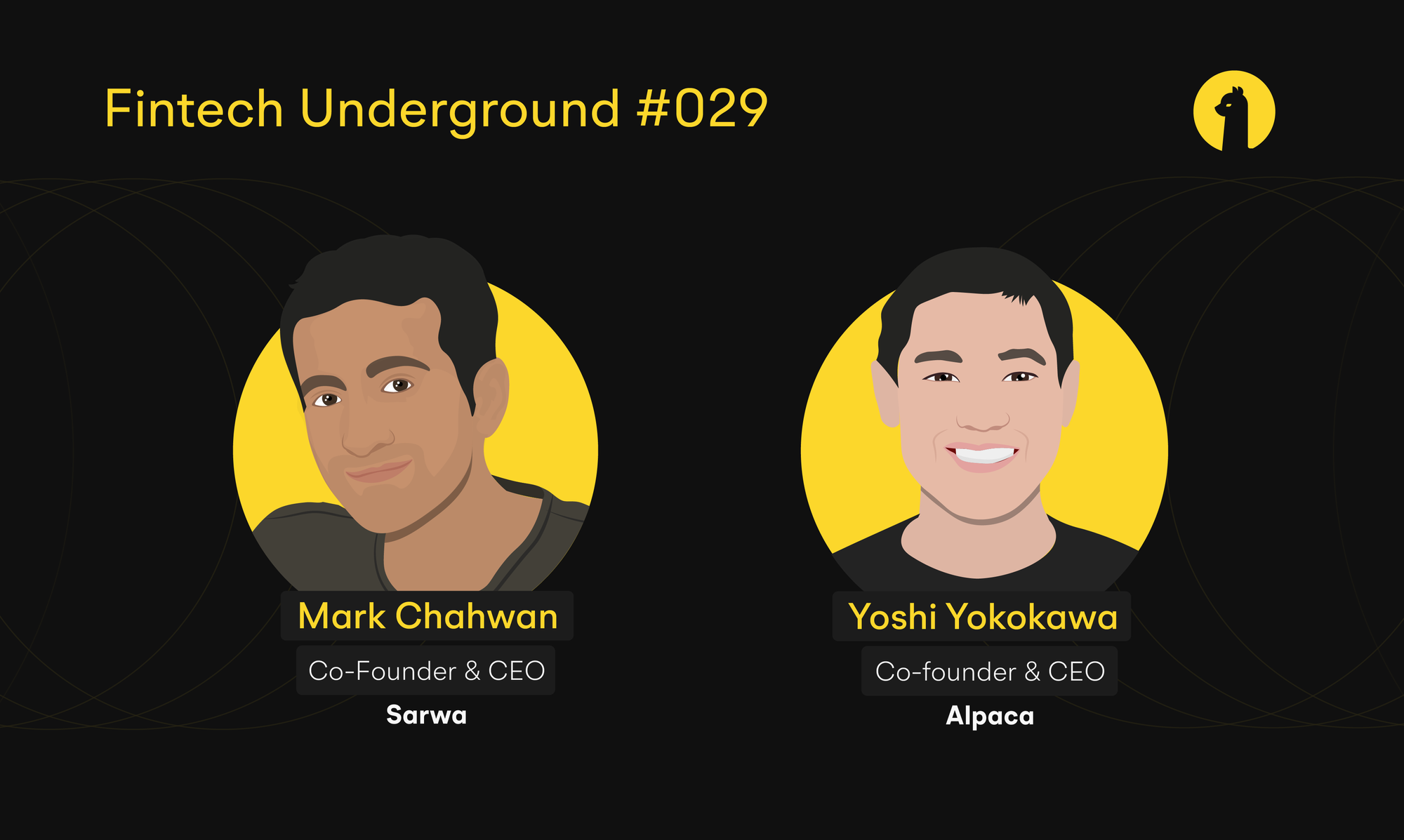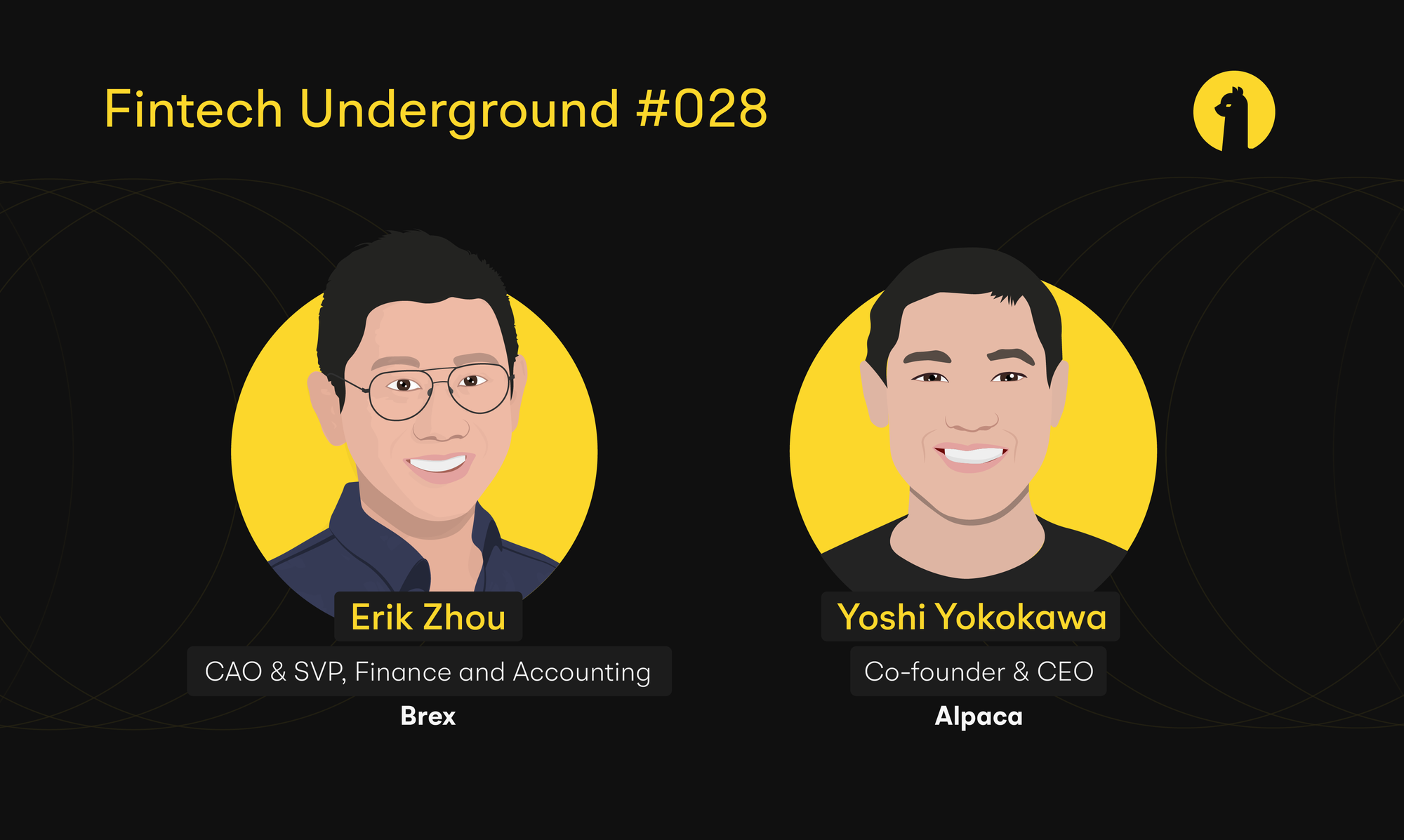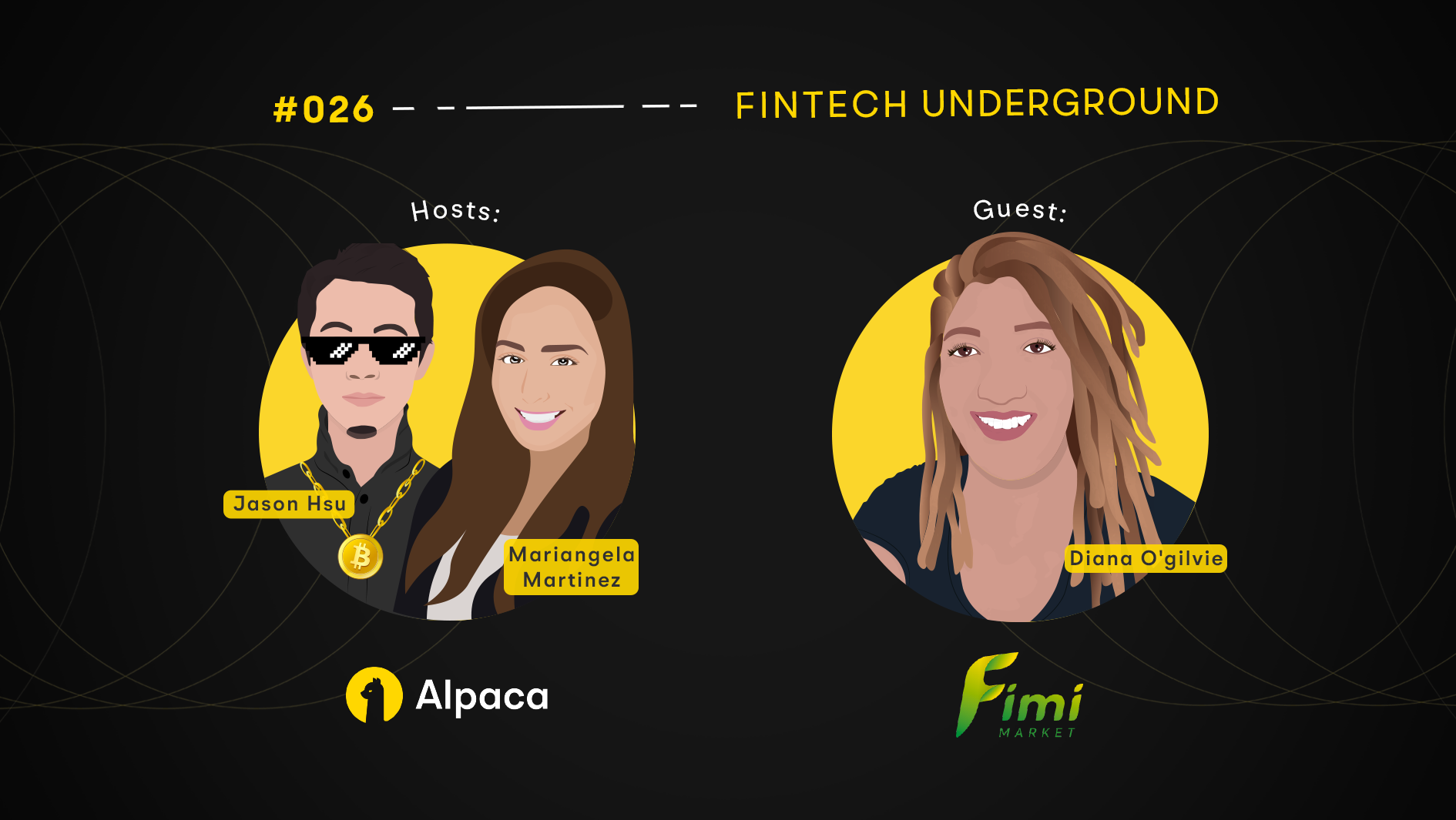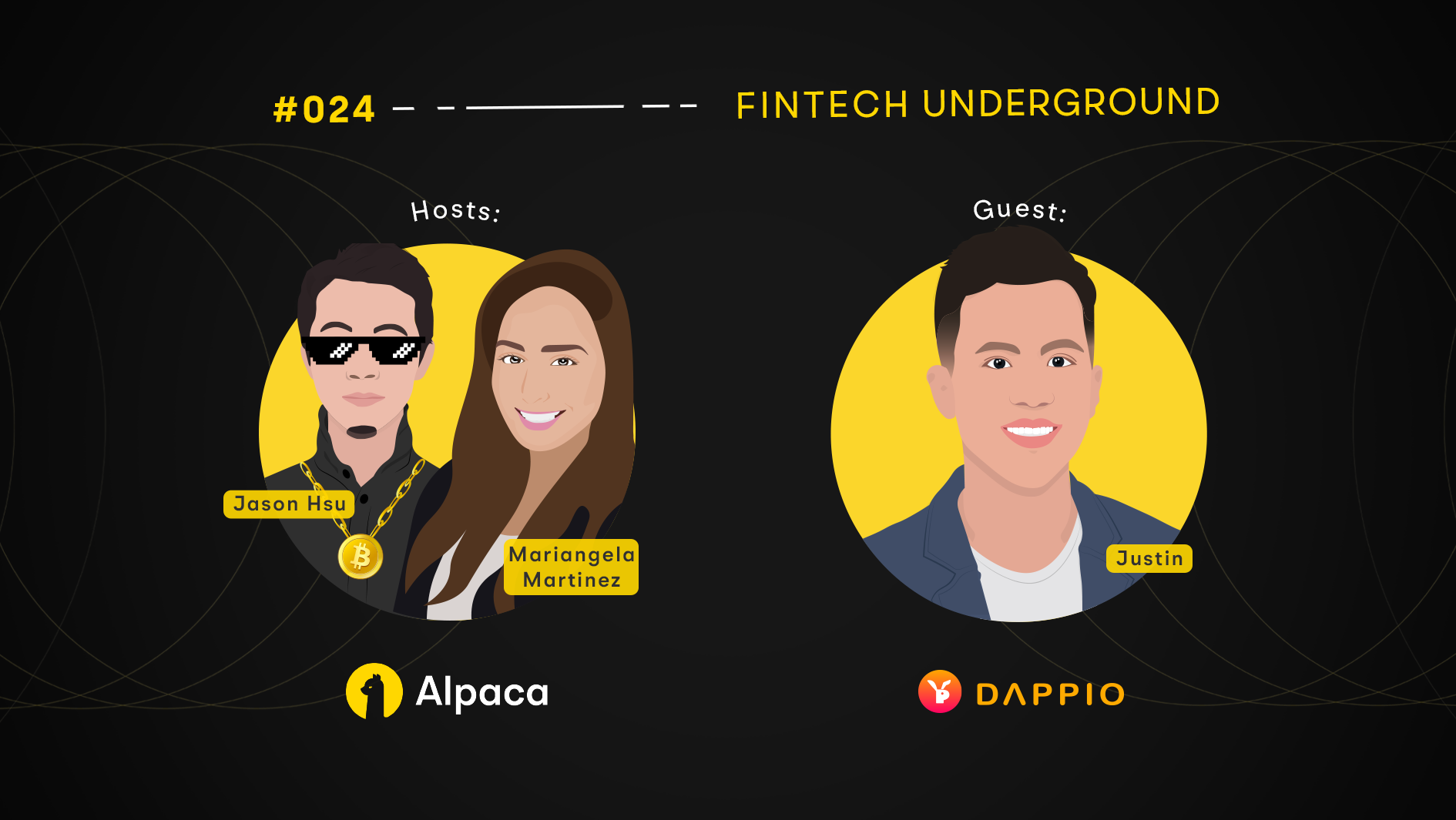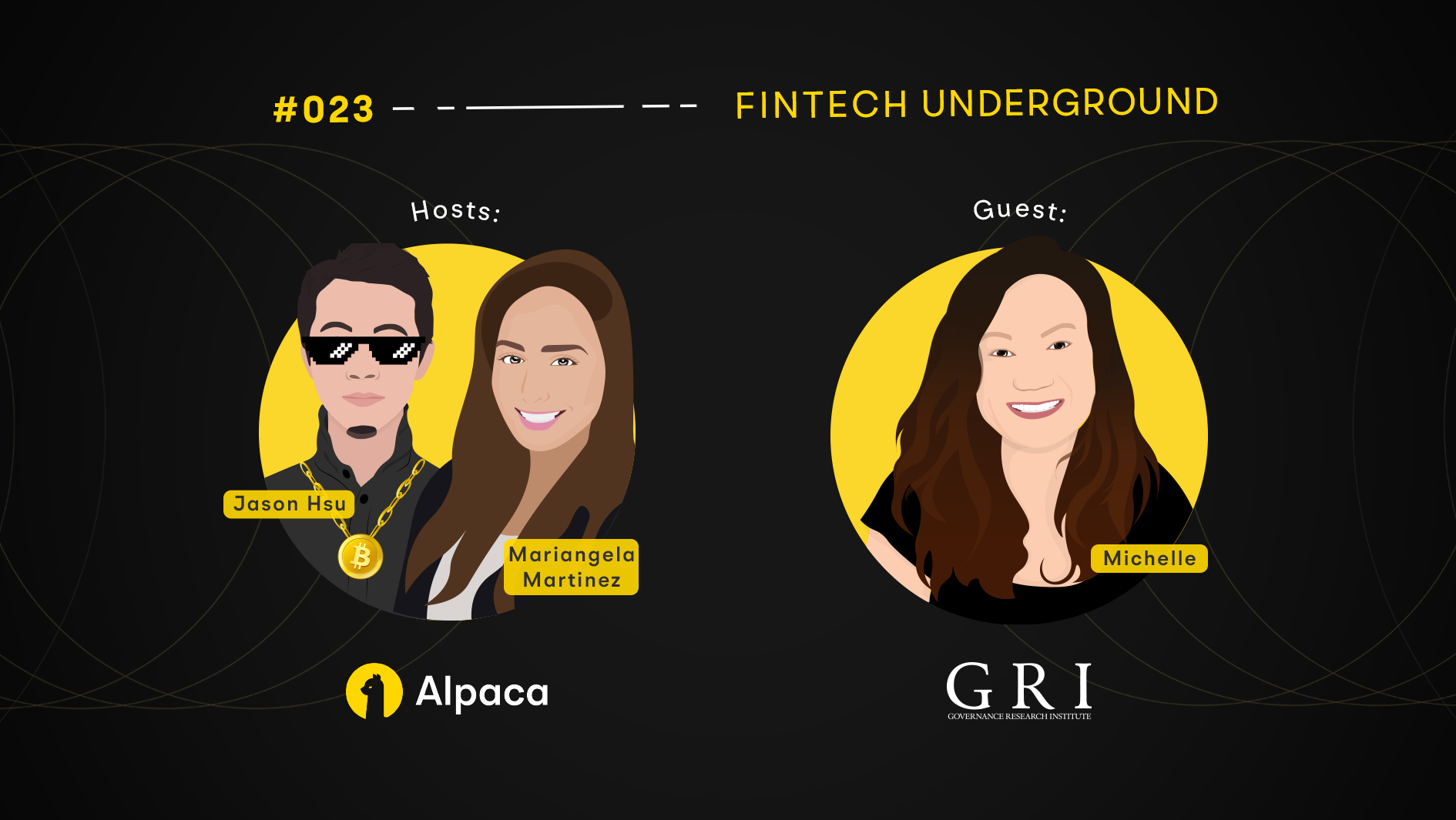
All views and opinions expressed by the guest speakers are solely their views and opinions and do not reflect or represent the views and opinions of Alpaca Securities LLC, Alpaca Crypto LLC, and AlpacaDB. The guest speakers' opinions are based on information they consider reliable and therefore Alpaca Securities LLC, Alpaca Crypto LLC, and AlpacaDB do not warrant its completeness, accuracy and it should not be relied upon as such.
The content is for general informational purposes only. Alpaca Securities LLC and Alpaca Crypto LLC do not recommend any specific investments, investment strategies or cryptocurrencies.
Fintech Underground by Alpaca is a podcast devoted to all topics related to stock trading and APIs. From trading with algorithms or connecting apps or building out services, we aim to bring light to the different corners of Fintech.

TL;DR
In episode 23 of Fintech Underground by Alpaca, we interviewed Michelle, co-founder of Governance Research Institute. We go over how blockchain works, where blockchain is at right now, and where it's going.
Find the full transcript below. To hear more of the most interesting Fintech companies speak about their experience in the industry, check out our other episodes below.
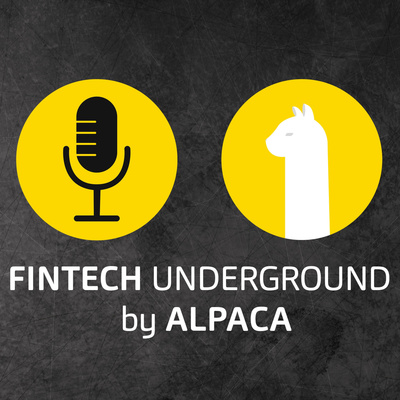
Full Transcript
Alpaca is a developer-first startup focused on building open APIs for stock and crypto trading, investing, and embedding. You can learn more by visiting our website at alpaca.markets. You can also find us on Twitter @AlpacaWeb3 or join our discord community also with the invite link @AlpacaWeb3.
Mariangela: Hello, I'm Mariangela Martinez, host of Fintech Underground. And this is Jason Hsu, Crypto Growth Manager at Alpaca.
Jason: Hello.
Mariangela: We will be hosting today's podcast on blockchain and recent developments. Our guest today is Michelle, Co-founder and Director of Governance Research Institute, a facility that focuses on researching the use of blockchain and AI and how it can be applied to make organizations and institutions more efficient.
She has vast experience as a mentor and advisor for blockchain, accelerators, ventures, and academies. And I won't forget to mention she went to law school.
Michelle: Hello, thank you for having me.
Mariangela: Thanks, Michelle. Before diving into the podcast, any topic talked about in this podcast is not financial investment and/or tax advice. We encourage our listeners to seek individual advice should they deem it necessary.
Michelle would you like to give an intro about yourself?
Michelle: Sure. So my name is Michelle, I wear different hats, really excited about technology. And was an attorney at PayPal for six years. I wanted to do a startup. So I love PayPal and thought, oh, I have no bars, no like limitations, no glass ceilings anymore. I wanted to build companies. So that's what I did. And I was willing to really walk into the role of unknown and that includes blockchain. I thought payments is gonna be gone forever in my life, right? Because I was breathing and speaking payments every day.
And then I co-founded a blockchain company in about 2014-2015. In 2013 also helped the MIT/Stanford venture lab with putting together a conference called Virtual Currency. And payments and blockchain stayed with me, even though I was doing a lot of AI companies, it was still there, and everything just kind of converged. Today I'm really excited about talking about blockchain. That's basically some of my experiences.
Mariangela: That's very impressive. That's a lot of experience and going from law school to blockchain, doing websites, that's incredible.
Jason: For our listeners, I see Michelle everywhere. First met her at Berkeley and then recent years, just all over different conferences, Consensus in Austin.
Michelle: It was fun though. I kinda love one of the big differences between blockchain and cryptocurrency versus areas of innovation, is that we have a really good community. Community is first in the blockchain/crypto space. So I think it's kind of nice to actually go to these conferences and talk to different people and meet different people.
I remember when I first left PayPal, I was anonymous, so I would go to a conference and I would only speak with one or two people, but I was really inspired by the ethos of what decentralization stands for. It is not being rebellious, it's not about crime or anything, right? It's just really about innovation and it is about community of innovation building together. There's a thing called WAGMI that we are all gonna make it, you know, which is really about collaboration and less about competition. I think that ethos is awesome.
Because I know from web2 and web1, there's only a few that would survive and a few did survive and there's a whole concentration of power regarding those companies, they own most of the data, they have stock and shareholders and four or five people became really wealthy as a result of that. But then they do also exploit and use our data so that they would enrich themselves. I think that's why we're all over the place; blockchain and crypto is really about community.
Mariangela: How did you first become interested in blockchain?
Michelle: This is kind of funny. We had a conference about virtual currency and for me, as an attorney at PayPal, it's digital money. It's the same, because when the founders started PayPal, the idea was money from palm to palm. So when you read the white paper of Bitcoin it's peer to peer payments without chargebacks. I remember when my co-founder for the digital wallet talked to me in 2014-2015, the first thing I did was print out the payment structure and cross out The Clearing House, ACH. Then I started working on a provisional patent on blockchain technology and digital wallet. So, with crypto 2013, with blockchain 2014 and 2015, I think they are interrelated. But I'm gonna separate them to answer that question, because I think it's a little bit easier.
Mariangela: And then what was the jump like from law to blockchain/web3?
Michelle: It was pretty smooth. I was a web developer and technical writer when I was in college. For me, I love technology as a user. So I would always try to buy the latest camera, the latest phone and the latest tech. When you work with digital payments, like you heard of second life, there is also macro trends of digitalization. I remember when I was at PayPal, Zynga was like two years old, it kind of outgrew eBay. And it became like a large merchant. I think the transition for me is actually pretty smooth. Like I understood what blockchain and cryptocurrency is immediately, for me, it's just like, "oh my god, we're gonna talk about payments again."
Mariangela: Yeah. When did you decide to build metaverses and why?
Michelle: Sure. I divided my brain into different parts. I have left brain, right brain and a nonprofit. For me, I'm an inner child artist. So during hibernation, I started making augmented reality filters or effects, and within two weeks my augmented reality effects became viral. And as a result of that, I had millions of impressions. And before that I was a professional photographer as well. I can draw really well, pencil and airbrush and all the medium. When NFT became really hot, I didn't really like the 2D aspect of NFT because I just feel like it's not spatial. I spent a couple years during COVID hibernation just doing a lot of augmented reality and that's spatial computation. So I'm not used to 2D images. I know that they became really popular, especially PFP.
So then I decided to have the NFTs onto metaverse. So I co-founded a metaverse company specifically because I love how art it's hung in the metaverse in VR or even AR. So then I started building metaverses and I'm very comfortable with working with 3D, actually created 3D jewelry in 2012 or 2013 and have a 3D jewelry shop.
When I was making augmented reality, besides makeup and immersive experiences, I was also working with a lot of 3D objects, where you can wear like a hat, you can build earring. They're actually really cool. You can become a unicorn if you want, and it's really going to that world of fantasy where you could be what you wanna be, what you choose to be.
With metaverses we can custom make it from scratch and bring you and your friends into a fantasy world, created by our imagination. And you can meet people there. You can hang out, you can actually buy NFTs and see cool stuff. We began just building metaverse, we're still making it. Actually, we are gonna create a concert in the metaverse with a Grammy award winning DJ. So really excited about that.
Mariangela: Wow. It's all very impressive. So since you first started, how have you seen blockchain develop?
Michelle: It has gone a long way. In 2013, nobody really talks about blockchain. In 2014-2015, no one really talks about blockchain except for China, because people from China came and talk to us. Literally someone did research and actually talked to our startup at that time.
And then 2017, 2018, the fundraising became really, really popular. However, during the ICO phase, people didn't really take care of their money. Treasury management became an issue. However, we fix it, because then DeFi became really hot and people were earning yields and they know how to finally manage their treasury. And then NFT become hot. There's mass adoption, or more of a mass adoption in terms of the changes there's a lot of people who sign up for an account, but in terms of use of NFTs and token, I think we're are going to get there. We're really not fully there yet. Except probably for some of these NFT platform.
It has grown a lot, but we're still early stages, as you can see in the last two, three weeks, I mean maybe month, there's still a lot of challenges in terms of regulation, in terms of compliance, how do we move people's money around? Do we restrict their money? What happens with interest goes up, stablecoins, what happens if it goes below a dollar, is it a good idea, it's a peg against volatility. And then DAOs, so a lot of people say that they have created DAOs, and it seems really simple because they just put up a smart contract and then call it DAO, and it's a DAO, but those are not DAOs because if you look at their governance structure and then voting and proposal, is there any deterrence against greed and conflict of interest or they're secure because there's a lot of like bridges that get hacked every day. I don't think we're fully there yet, but I think people are looking at some of these challenges and they're going to fix it, I'm really, really excited about.
Mariangela: Yeah. It's a lot of change and it might take time. It's a long process. So you worked as a mentor at several organizations and academies, and at Berkeley Blockchain Xcelerator where you met Jason, what was the experience of being a mentor like?
Michelle: I love being a mentor. It's kind of fun for me. For Berkeley Blockchain Xccelerator, when I met Jason, I spoke with a few projects, one after another for almost the entire day. And it was kind of fun. I also get to hang out with some of the projects afterward, with some of the ones from that batch, we went to a Halloween party. I see Jason around. And then with some of the other ones, I've seen them grow, doing the whole cohort, and then there's demo day, sometimes projects come in with they don't know what the revenue model is, they don't what the business model is. And then all of a sudden, you see the person change. They become more confident. They got a lot of MOUs and it's just amazing. I think it's a little bit rewarding for me. I kind of enjoy seeing all the changes in the founders and just seeing how they grow. And then just making friends, it brings me joy.
Jason: Yeah. Michelle was a lot of help back then. We were early, but we also had existing angel investors. We were just looking to raise from maybe more notable VCs in the US. And we were still kind of structuring, coming up with a consistent and good story that has a broad vision, but also highlights our achievements at the time.
So yeah, Michelle has some good advice then. Are you still in contact with some of the other members, company projects in our cohort. Cause I see, like we have these telegram groups which you're like the group creator, but I don't see their names around, but we do have a lot of new friends.
Michelle: Yeah. So I had lunch with a few founders in the bay area and then certain people from Berkeley reach out to me because they want introductions to certain people or I'll see them around and if they have questions I'll help from here and there.
I'm pretty close to a few people and I've also had my telegram group where people could share stuff, they have questions and I try to be like available as much as I can. It's kind of nice that the community, they're curious, so they ask questions, and people basically share events and help each other, which is really what the community is about.
Jason: Yeah. Yeah. I get that. On the other side, Alpaca, we're fully doxxed. Like sometimes it's used as a selling tool be like, oh, we're not an anon-team. Even though we're working on a web3 project. So yeah, feel free to look into our team's background.
Michelle: Yeah. I love your project. I went to Consensus and I checked out your booth. It was so funny because there were three booths right next to each other and I was like met and visited everyone at the same time.
Jason: Yeah. Yeah. I don't think you came to our Alpaca farm event though.
Michelle: No, I probably don't know about it. That's fine.
Jason: What? No way.
Michelle: Yeah, you gotta share events with me so that I can visit. Are you going to Korea?
Jason: No, our next one is, we're heading to a more tradfi event called Money20/20 in Vegas.
Michelle: Oh, I love Money20/20, that's awesome.
Jason: Will you be going? We'll have a booth.
Michelle: Oh, awesome. Yeah, just let me know about the event I was there last year in October.
Jason: Okay. Yeah. I'll let you know. It's like late October.
Michelle: Yeah, yeah. I went there and then I went to Art Basel, and then Puerto Rico Blockchain week. It was awesome.
Jason: They had Art Basel in Puerto Rico?
Michelle: No, no. Art Basel in Miami and then Puerto Rico Blockchain week.
Jason: I was there. Yeah.
Mariangela: So much traveling. I'm kind of jealous.
Jason: It gets really tiring though. Cuz its though, people don't sleep. It's all about the after events and then the after after event.
Mariangela: Yeah. But you get to meet so many people that are in the industry and that's amazing.
Michelle: Yeah, it just it gets very expensive and it gets very tired. Yeah, we drive up crypto conferences, drive up all the prices of Uber, as well as air flights, airfares and everything else.
Mariangela: So as a co-founder at Governance Research Institute, GRI, what is your goal for blockchain and organizations and what is GRI's uniqueness?
Michelle: Our goal for a blockchain organization is to have good governance. We wanted to see people build DAOs and governance structure that basically is transparent and has accountability. We see all over the world that there may be corruption and we feel that if we deter fraud and corruption, then the organizations could be run more efficiently.
So it's not just about putting a smart contract out there and say that it's a DAO. But you gotta really think about what kind of governance structure you would like and then what are the roles of humans, and then how could smart contracts play a role, for example, you can maybe submit proposal, maybe you can vote, and what gets executed and what are the governance economics, we call it govenomics, that basically motivate people to vote and then also to correlate and make decisions for that organization, those are gonna be really, really important.
Mariangela: Thank you. And there's a lot of debate over where to draw the line between protecting users and hurting innovation in crypto. What are your thoughts on crypto regulation and where it could be headed?
Michelle: I think regulation in the last couple years has been really slow. This is not legal advice; in the US there's certain framework. There's a lot of debate between what is utility, what is security, for the first couple of years. I think the government is still thinking about stablecoins and they focus a lot on fraud and money laundering and a lot of compliance matter, and I think even with cash there's a lot of that. But one of the concerns is everyone moving outside of the US so that they can innovate, is all the innovation in Asia, in Europe and everywhere else outside of the US, because nobody could innovate in the US.
How are the cities and states, what are they doing to allow for innovation? Sometimes the organizations between the state and federal level might not align. So what is the alignment regarding that? We see that, for example, Wyoming is very DAO friendly. They allow you to create a DAO, LLC. However, if they issue tokens, you still would need to comply federally, sometimes people are really confused about that. However, if you go to Europe, if you go to Switzerland, for example, you can maybe innovate a little bit easily easier.
At the same time, I also understand that normal people could be hurt by innovation because they could put their money in an investment, not knowing what they're investing in and they may not have the transparency or the knowledge about AI or blockchain or one of the vertical. They might blindly invest and I think that becomes a little bit dangerous, because I've also seen Enron and like from the past. A lot of retired people lost their money and it was really hard on them. So surveys, Oxley basically came into play as a result of that.
And we are in a space where we are working with money, things with value, like Bitcoin, cryptocurrency. And so we need to innovate, but at the same time, protect the normal people so they don't get hurt by misrepresentation or investing in things that they don't know about.
So I think we still need ways to go in terms of one, educating the masses, and two, having regulations that are not stifling innovation, but at the same time is relevant to crypto and even the previous regulations, some of them don't apply to crypto because there's nuances. In that instance to law makers, use regulations in the past, even though we have changed or society has changed or innovations have changed or should we create new ones that basically have the technology in mind.
Those are some of the things I think that the regulators are doing and they're taking a longer time. But I rather that they did take a longer time to understand things than to just randomly making regulation to govern the industry. That's where we're at right now. And hopefully, working groups and education and communication with the industry are there so that they could better understand all the different nuances between DeFi, just blockchain and then NFTs, and stablecoins, so that we can move forward.
Mariangela: Now, about blockchain. Why and how important is it to have a good blockchain technology? What are some downsides of not developing it well?
Michelle: Well, I'll talk about downsides first. I think if we don't develop it well, or we're not conscious of it, it could become an animal farm, where it would be the biggest tracking device ever. Imagine if all your financial data is in the blockchain, and where is your money, how like attracts all your money, what you got, what you receive, those are going to be on the blockchain and it can be destroyed or destructive, all your privacy and all the information on the blockchain, especially if it gets hacked. So I think that is one of the downside of it. Creating one technocratic state, where a certain concentration of power and people controls everything and someone is playing God. And I think that becomes really dangerous and even more dangerous than web1 or web2 where a few people basically owned a lot of the innovation and technology.
And with that, a lot of influence in government and other areas of life. And so I think that's why it's important to have a good blockchain. And when I wanted to talk about blockchain, I don't wanna say is technology, because I feel like blockchain as a technology is a tool of creating an ecosystem or even a company. I think it's important to say how do we want tomorrow to be different, how could we use blockchain to better the world so everyone could live better lives, and how could we create a better ecosystem for people.
That is, we learn lessons from web1 and web2, we don't want the same thing as before. I mean, we love technology. I think it has added value to our life, right? Now we can order everything that we want from Amazon. We have cars that take us around and we can interact with our friends. However, our data and everything is on one system and they sell them. And there's a lot of misuse and then there's a lot of censorship and control.
In parts of the world where there's a lot of corruption or the truth could be changed or manipulated, the blockchain could basically ensure accuracy and transparency. I did it on the house, I have the deed, a deed is on the blockchain. You can't change that. If you're fleeing from war and you lost your birth certificate, if those are on the blockchain, you could be anywhere and its there. If there's fire and you burn your house, your art is gone, you'll find your art on the blockchain, just by locking in.
And so I think there's really good uses for the technology, but I'm just hoping the human aspect of it, where it brings the artists and everyone in and there's humanity. And so I'm just hoping that web3 is going to bring humanity to our ecosystem, where we basically have ownership back of our data, we have co-ownership in terms of a part of a company. We don't own Facebook, but we contribute to it every day by going there and sharing stuff, and it has a collective consciousness. It is a connective consciousness, we should own a part of that company.
I think that's what we're doing with tokens and with blockchain, where we're owning a part of something, and the technology allows for it, and it has incentivization for us where we could be incentivized to participate. And by doing things, by walking, by moving, by posting, we basically earn something and have something back. It becomes more mutual instead of just one sided. So I'm looking forward to that. And hopefully as a whole, most of the people and the people who are building today are building something awesome. So that maybe tomorrow it would be a little bit different from web1 and web2.
And I think we can do it because when you really think about the internet, it happened when I was alive. Yahoo was kind of new when I was in college and Facebook is recent as well, and so is Google. In the last 10 years, we see the growth of technology. And we've seen how things are used or done. So with web3, if we chose collectively as something better, we wanna give ownership back to the people, how could we do that as a community? And what kind of like people we celebrate, and what does that mean, what does DAOs structures look like, or even tokenomics and how does regulations look like, who's regulating, is it global, is it one state, is it one country, how do we work with other countries, how does IP look like? There's still a lot of important conversations to have, and it's really exciting at the same time.
Mariangela: Yeah. A lot of conversation, a lot of topics that it'd be great to talk about. Would you like to say anything else to our listeners?
Michelle: Yeah. If you're listening to this and if you are building something or thinking about what you wanna do with your life and you're afraid, I would just say go for it. If you wanted to do a startup, if you wanted to build a new company, I think the hardest thing is finding a team that would build with you, but you gotta start making friends, and start building it and not be afraid of failing and just let that failing be normal. You can do things over and over again differently until you make it. And then think of something that could make the world a better place tomorrow, and then find the people to build that.
Even if you fail, that's fine. Just get back up and just do it again. Building companies and doing startups, it's hard, and there's a lot of luck required, but it's also very rewarding, and so, because you're changing lives, you're impacting people. If you have thought about that, I really encourage you to do it.
Mariangela: Thank you for that. Thank you for joining our podcast, it was a pleasure having you here with us and you are very impressive, every time you kept talking about your experience..
Michelle: Thank you. I thought that when I left PayPal that I would live by the lake and not do anything. I just kind of follow the things that I love and not look at titles; my life has changed. So I just really appreciate you and Jason for having me here. And I think most important of all, I just don't want people to focus on me, but really focus on the mission of building a better world because I think when I did like lovingai.org or distribute computation, and robots without border, those are not popular because those are not trendy a couple years ago, but I basically did them anyways, because that's what I love.
Just do things that align with what your passions are and then focus on that because you just can't focus on people. Because once you do, you are gonna become very people-focused and sometimes it hurts you because it destroys your esteem. And I think it's important to everyone here, when you're listening, to love yourself and define your purpose by yourself and live a life of your dreams and that's completely, completely possible.
Thank you both for having me. I'm really, really excited and really honored and grateful to speak with both of you today.
Jason: Thank you. It's always good to hear from you, meet you in person. Hopefully I bump into you again soon. Thanks for coming on today.
Mariangela: Thank you, Michelle. We appreciate you.
Michelle: I appreciate both of you.
Mariangela: Thanks.
You can find Governance Research Institute on Twitter @GRIgovernance. You can find Michelle on Instagram @cryptoMichelle, on Twitter @bitgoddesses, @salutemichelle and @laptop_radio.
To our listeners check out Alpaca for more information about stock and crypto trading, and always remember to do research before investing.
The content and comments of this podcast should not be taken as Alpaca providing investment legal, and/or tax advice. Every situation is different and you are encouraged to seek independent, legal and investment and/or tax advice. Cryptocurrency is highly speculative in nature, involves a high degree of risks, such as volatile market price, swings, market manipulation, flash crashes and cybersecurity risks.
Cryptocurrency is not regulated or is slightly regulated in most countries. Cryptocurrency trading can lead to large, immediate and permanent loss of financial value. You should have appropriate knowledge and experience before engaging in cryptocurrency trading.

